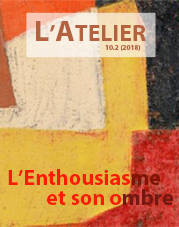Oliver Sacks's "violent enthusiasms": "immoderation" as medical/literary ethics
Keywords:
autobiography, case study, empathy, line of light, medical humanities, narrative, Oliver Sacks, passion touchAbstract
Alors qu’il avait conscience que sa fin était proche, Oliver Sacks prit Hume pour modèle ; mais il nuançait les affinités qu’il avait avec sa pensée, en revendiquant l’énergie de l’enthousiasme. C’est en effet l’enthousiasme qui le caractérisait ; les détours par la drogue ou la vitesse, dans sa jeunesse, furent autant de modalités sensorielles exaltantes permettant de déterritorialiser la perception ; il eut toute sa vie la passion de la médecine, des sciences naturelles, de la natation, de la musique et de l’écriture. A la carte striée de la médecine formelle de plus en plus technique et détachée, il voulut opposer une pratique nomade et déterritorialisée, naviguant entre les disciplines, à la croisée des sciences et de la littérature, du savoir et de l’humain. Née de l’interaction entre le patient et le médecin, la mise en récit vise à mettre en évidence la vulnérabilité, à partager l’expérience de troubles longtemps tus ou occultés. Certains critiques, comme Tom Shakespeare, refusent l’enthousiasme comme profession de foi, considérant que dérober la parole du patient relève toujours d’une imposture. On peut aussi considérer que la reconfiguration littéraire permet une forme de témoignage. Les interactions de Sacks avec son lectorat révèlent la fonction libératrice de ses écrits, tandis que ses récits engendrent à leur tour mise en musique ou mise en scène, un recyclage narratif qui témoigne de la prégnance de l’enthousiasme.
Aware that his end was close, Oliver Sacks sought inspiration in Hume’s philosophical equanimity, while stressing an essential difference—his own belief in enthusiasm. Sacks indeed seemed to embody enthusiasm. In his youth, he sought to break the threshold of perception by dabbling in drugs and speed on his motorbike; he was characterized by his lifelong passions for swimming, music, plants and minerals, and above all medicine and writing. Refusing to fit within the formal frame of medical practice, perceived as technological and monolithic, Sacks longed for cross-disciplinary lines of flight, blending science and literature, abstract knowledge and a human or humane approach. Returning to the tradition of case studies and Romantic science, Sacks sought new ways of engaging with his patients by telling their stories. This may be read as voice appropriation, as pointed out by critics like Tom Shakespeare. But interaction with his readership also reveals the liberating dimension of his belief in enthusiasm; and the response of writers and artists, some of whom have a condition of their own, shows that his narratives breed other configurations that help to break social invisibility and prompt readers and spectators to rethink vulnerability.
Published
Issue
Section
License
- Work submitted for publication must be original, previously unpublished, and not under consideration for publication elsewhere. If previously published figures, tables, or parts of text are to be included, the copyright-holder's permission must have been obtained prior to submission.
- Authors of accepted manuscripts will assign to L'Atelier the right to electronically distribute their article, or publish it in any form (Internet, CD ROM, printed copy) but authors will retain copyright and, after the article has appeared in L'Atelier, authors may republish their text (in print and/or electronic form) as long as they clearly acknowledge L'Atelier as the original publisher.


